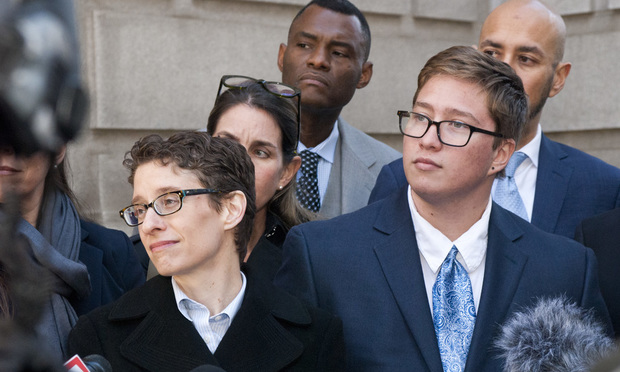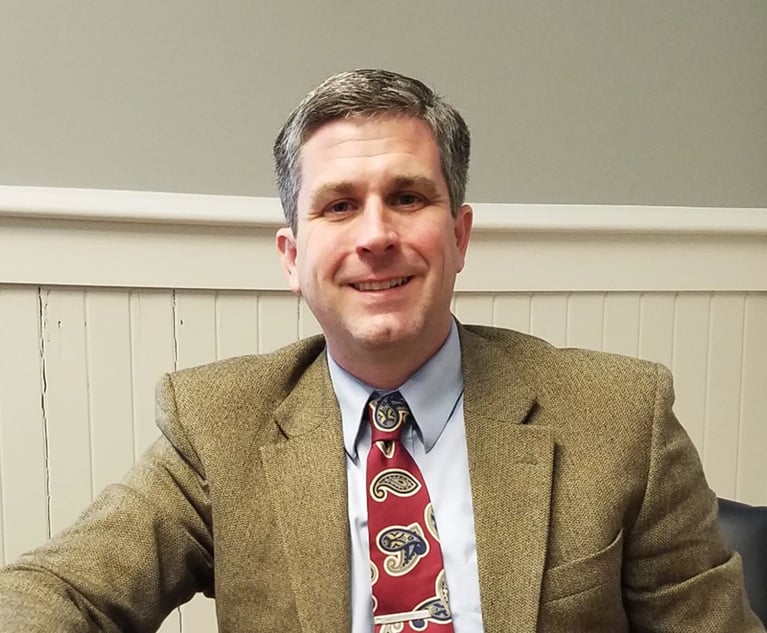Judge in Transgender Case Asks: Why Have Separate Boys' and Girls' Restrooms?
A lawyer for a transgender boy says no one is asking to end gender separation in school restrooms.
December 05, 2019 at 12:44 PM
6 minute read
 Tara Borelli (from left) of Lambda Legal outside the courthouse for the U.S. Court of Appeals for the Eleventh Circuit in Atlanta with her client Drew Adams. (Photo: John Disney/ALM)
Tara Borelli (from left) of Lambda Legal outside the courthouse for the U.S. Court of Appeals for the Eleventh Circuit in Atlanta with her client Drew Adams. (Photo: John Disney/ALM)
A federal appellate judge and a lawyer for a transgender student engaged in a tug of war Thursday over how far a decision in his favor would or should extend.
Judge William Pryor of the U.S. Court of Appeals for the Eleventh Circuit focused repeatedly on whether the underlying ruling, which held that a Florida school district could not bar a transgender boy from the boys' restroom, suggested students shouldn't be separated by gender at all.
A girl would have standing to sue to use the boys' restroom if she claimed her grades suffered because long lines at the girls' restroom prevented her from getting to class on time, said Pryor, who presided over arguments.
"We used to have [racial] segregation of water fountains," he added. "It was profoundly offensive."
Arguing for the student, Tara Borelli of Lambda Legal responded that no one in the case was arguing for the end of sex segregation for school restrooms.
 Judge William Pryor Jr. (Photo: Diego M. Radzinschi/ALM)
Judge William Pryor Jr. (Photo: Diego M. Radzinschi/ALM)As for Pryor's hypothetical plaintiff, Borelli said "the harm is different" from the documented distress of transgender people who can't live by their true identities.
Her client, Drew Adams, was born with female body parts but always insisted he is a boy. He had surgery and took other measures to change his appearance, and he had his birth certificate changed to list his gender as male.
St. Johns County school officials in Ponte Vedra Beach, Florida, barred him from the boys' restroom, requiring him to use a unisex restroom, which he found demeaning and inconvenient. He claimed violations of the 14th Amendment's equal protection guarantees and sex discrimination under Title IX. Last year, Judge Timothy Corrigan of the U.S. District Court for the Middle District of Florida ruled for Adams.
The school district appealed, and briefs from both sides focused on a 2011 Eleventh Circuit decision that Corrigan cited as binding authority. In that case, Glenn v. Brumby, 663 F.3d 1312, the court ruled a transgender staffer fired by the Georgia Legislative Counsel was the victim of illegal sex discrimination.
One of the panel members who joined the unanimous decision was Pryor, whose confirmation 15 years ago was opposed by advocates for gay, lesbian, bisexual and transgender people based on anti-gay rights positions he took as Alabama's attorney general.
Lawyers for the school district argued in briefs that Corrigan and other judges around the country applied the Glenn decision too broadly. "This case presents an opportunity for this Court to clearly define what constitutes impermissible sex discrimination and clarify its holding in Glenn," they wrote.
Adams' lawyers responded that Glenn is the Eleventh Circuit's "leading, foundational authority holding that discrimination against individuals because they are transgender is sex discrimination."
On Thursday, school board attorney Jeffrey Slanker of Sniffen & Spellman in Tallahassee, Florida, had to contend with a different hypothetical—this one posed by Judge Jill Pryor.
 Judge Jill Pryor. (Courtesy photo: Guerry Redmond)
Judge Jill Pryor. (Courtesy photo: Guerry Redmond)Unlike Adams, who was known as a female in the school system before he began his transition, Judge Jill Pryor imagined "Sam" transferring to the school system in the ninth grade after his transition. Would Sam be able to use the boy's restroom?
"The school board won't play bathroom cop," Slanker answered, saying it would deal with these questions individually.
Judge Beverly Martin found "a bit of arbitrariness" in that policy tied to when somebody arrives in the school system.
Martin dove into the debate between Judge William Pryor and Borelli over how expansive a decision should be. Could the court affirm the lower court's ruling for Adams narrowly?
"That's precisely what I'm asking," Pryor noted.
 Judge Beverly B. Martin (Photo: John Disney/ALM)
Judge Beverly B. Martin (Photo: John Disney/ALM)Martin also asked whether the panel should wait for the U.S. Supreme Court to decide a pending case, R.G. & G.R. Harris Funeral Homes v. EEOC, based on whether the word "sex" in Title VII's prohibition against sex discrimination means "gender identity" and includes "transgender status." It also asks whether a 1989 high court precedent prohibits employers from applying sex-specific policies based on an employee's sex rather than gender identity.
Borelli said the high court case would not have a significant effect on Adams' case and urged the court to rule as soon as it could.
The case is being watched closely around the Eleventh Circuit, which includes Georgia, Florida and Alabama.
School officials and parents in Pickens County, Georgia, also have been wrestling with a transgender restroom question. In October, School Superintendent Carlton Wilson sided with the lawyers telling him the law was on the side of transgender students using restrooms corresponding with their identified gender.
"I've been told by legal counsel, several different legal counsels, upon receiving a lawsuit, that we will lose that lawsuit, and it will cost anywhere from several thousand dollars up to a million dollars," Wilson told WXIA-TV.
But when pushback against the policy escalated into threats, Wilson reversed course.
Related News
Justices Wrestle With Georgia Case, Others in LGBT Rights Debate
This content has been archived. It is available through our partners, LexisNexis® and Bloomberg Law.
To view this content, please continue to their sites.
Not a Lexis Subscriber?
Subscribe Now
Not a Bloomberg Law Subscriber?
Subscribe Now
NOT FOR REPRINT
© 2025 ALM Global, LLC, All Rights Reserved. Request academic re-use from www.copyright.com. All other uses, submit a request to [email protected]. For more information visit Asset & Logo Licensing.
You Might Like
View All

DC Lawsuits Seek to Prevent Mass Firings and Public Naming of FBI Agents
3 minute read

Apply Now: Superior Court Judge Sought for Mountain Judicial Circuit Bench
3 minute readTrending Stories
- 1With AI, What Changes Can Midsize Firms Expect?
- 2Saul Ewing Loses Two Partners to Fox Rothschild, Marking Four Fla. Partner Exits in Last 13 Months
- 3Eagles or Chiefs? At These Law Firms, Super Bowl Sunday Gets Complicated
- 4Former NY City Hall Official Tied to Adams Corruption Probe to Plead Guilty
- 5Wilmer, White & Case, Crowell Among the Latest to Add DC Lateral Partners
Who Got The Work
J. Brugh Lower of Gibbons has entered an appearance for industrial equipment supplier Devco Corporation in a pending trademark infringement lawsuit. The suit, accusing the defendant of selling knock-off Graco products, was filed Dec. 18 in New Jersey District Court by Rivkin Radler on behalf of Graco Inc. and Graco Minnesota. The case, assigned to U.S. District Judge Zahid N. Quraishi, is 3:24-cv-11294, Graco Inc. et al v. Devco Corporation.
Who Got The Work
Rebecca Maller-Stein and Kent A. Yalowitz of Arnold & Porter Kaye Scholer have entered their appearances for Hanaco Venture Capital and its executives, Lior Prosor and David Frankel, in a pending securities lawsuit. The action, filed on Dec. 24 in New York Southern District Court by Zell, Aron & Co. on behalf of Goldeneye Advisors, accuses the defendants of negligently and fraudulently managing the plaintiff's $1 million investment. The case, assigned to U.S. District Judge Vernon S. Broderick, is 1:24-cv-09918, Goldeneye Advisors, LLC v. Hanaco Venture Capital, Ltd. et al.
Who Got The Work
Attorneys from A&O Shearman has stepped in as defense counsel for Toronto-Dominion Bank and other defendants in a pending securities class action. The suit, filed Dec. 11 in New York Southern District Court by Bleichmar Fonti & Auld, accuses the defendants of concealing the bank's 'pervasive' deficiencies in regards to its compliance with the Bank Secrecy Act and the quality of its anti-money laundering controls. The case, assigned to U.S. District Judge Arun Subramanian, is 1:24-cv-09445, Gonzalez v. The Toronto-Dominion Bank et al.
Who Got The Work
Crown Castle International, a Pennsylvania company providing shared communications infrastructure, has turned to Luke D. Wolf of Gordon Rees Scully Mansukhani to fend off a pending breach-of-contract lawsuit. The court action, filed Nov. 25 in Michigan Eastern District Court by Hooper Hathaway PC on behalf of The Town Residences LLC, accuses Crown Castle of failing to transfer approximately $30,000 in utility payments from T-Mobile in breach of a roof-top lease and assignment agreement. The case, assigned to U.S. District Judge Susan K. Declercq, is 2:24-cv-13131, The Town Residences LLC v. T-Mobile US, Inc. et al.
Who Got The Work
Wilfred P. Coronato and Daniel M. Schwartz of McCarter & English have stepped in as defense counsel to Electrolux Home Products Inc. in a pending product liability lawsuit. The court action, filed Nov. 26 in New York Eastern District Court by Poulos Lopiccolo PC and Nagel Rice LLP on behalf of David Stern, alleges that the defendant's refrigerators’ drawers and shelving repeatedly break and fall apart within months after purchase. The case, assigned to U.S. District Judge Joan M. Azrack, is 2:24-cv-08204, Stern v. Electrolux Home Products, Inc.
Featured Firms
Law Offices of Gary Martin Hays & Associates, P.C.
(470) 294-1674
Law Offices of Mark E. Salomone
(857) 444-6468
Smith & Hassler
(713) 739-1250






